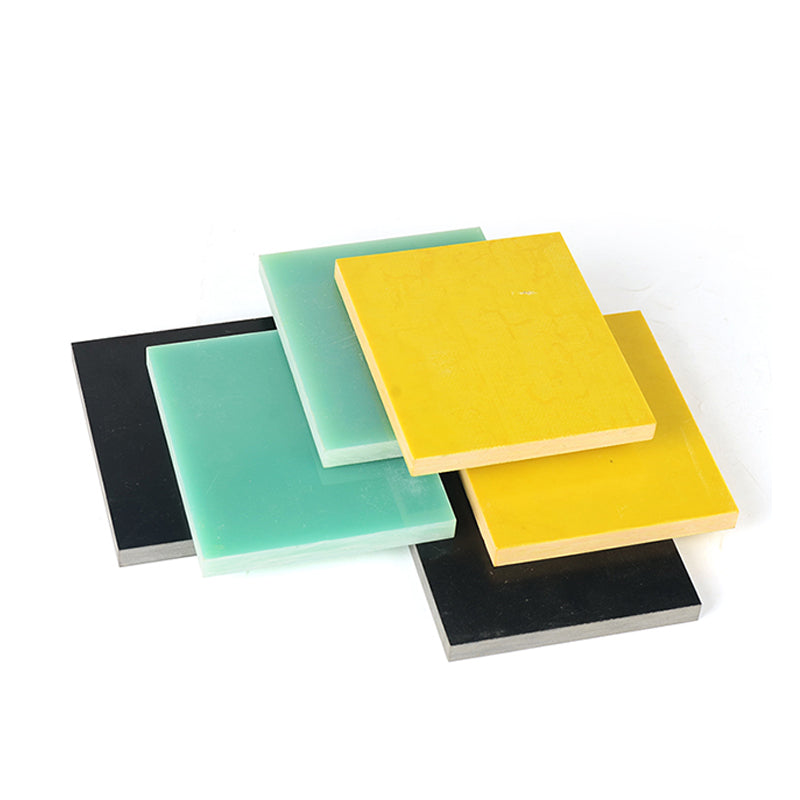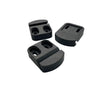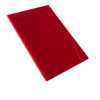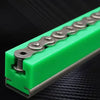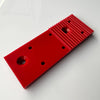Bakelite Rods: The Durable, Heat-Resistant Solution for Electrical and Mechanical Applications
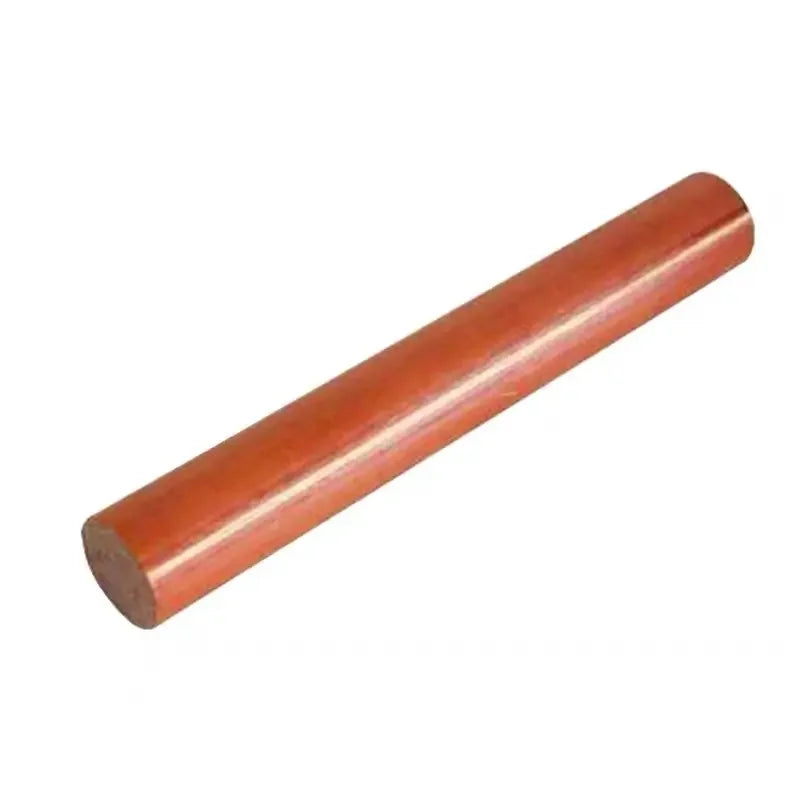
Bakelite rods are renowned for their exceptional durability, heat resistance, and electrical insulation capabilities. This blog explores the diverse uses of these phenolic rods, explaining what Bakelite is made of and the unique properties that make it ideal for industrial applications. From custom Bakelite rods to cotton cloth and fabric Bakelite rods, this guide highlights the options available for tailored engineering solutions. Whether for mechanical strength or as an insulation rod in high-stress environments, Bakelite’s properties deliver performance that meets the rigorous standards of modern engineering.

🎉🎉🎉Limited Time Offer Use code: QR4GNY08SHVR at checkout and enjoy a special discount on your entire order! 👉 Bakelite plastic
Key Points Covered in This Blog Post:
- Understanding Bakelite: What is Bakelite material, and why is it such a reliable choice for industrial and electrical insulation applications?
- Key Properties of Bakelite Rods: Dive into Bakelite rod applications, including high-temperature resistance, mechanical strength, and heat-resistant Bakelite uses.
- Comparing Bakelite and Phenolic Rods: Key distinctions between Bakelite rods and other phenolic resin rods, including types like fabric Bakelite rods.
- Industrial and Electrical Applications: A look at where Bakelite sheets and rods excel in machinery, electrical systems, and more.
- Customization Options: How custom Bakelite rod production adapts to specific dimensions and requirements across sectors.
- Future of Bakelite in Engineering: Why insulation rods and phenolic rods remain indispensable in engineering and manufacturing.
What is a Bakelite Rod and How is it Made?
Introduction to Bakelite Rods: A Historical and Practical Overview
Bakelite, a revolutionary material developed in the early 20th century, was the first synthetic plastic to gain widespread industrial use. Known for its excellent thermal stability and electrical non-conductivity, Bakelite has played a crucial role in the development of electrical components and consumer goods. The creation of a Bakelite rod involves the chemical reaction of phenol with formaldehyde under controlled heat and pressure, resulting in a thermosetting polymer known as phenolic resin.
The Chemical Basis of Bakelite: Phenol and Formaldehyde
The journey of a Bakelite rod starts in the laboratory, where phenol is mixed with formaldehyde. The presence of an acid or a base catalyst facilitates the reaction, leading to the formation of a resin. This initial reaction is only the beginning, as the resin must undergo further processing to become the sturdy, heat-resistant material known as Bakelite. During this process, the molecular structure of the resin changes, forming long, interconnected chains in a process known as polymerization.
Thermosetting: The Transformation into Bakelite
Once the basic phenolic resin is formed, it undergoes a curing process involving heat and pressure. This process is known as thermosetting, which irreversibly sets the material's shape. Unlike thermoplastics, thermoset plastics, like Bakelite, cannot be melted down and reshaped, which gives them their renowned durability and heat resistance. This characteristic is particularly crucial for applications that require the material to withstand high temperatures without degrading or losing its electrical insulating properties.
Enhancing Bakelite with Fillers
To further enhance its mechanical properties and workability, various fillers are added to the Bakelite resin. Common fillers include wood flour, cotton fibers, or mineral fillers. These additives provide the finished Bakelite rods with varying degrees of strength, resistance, and durability, depending on the intended use. For example, rods reinforced with cotton fabric are known for their enhanced mechanical strength and are extensively used in applications requiring robust, durable materials.
Manufacturing and Shaping Bakelite Rods
The final stage in the production of Bakelite rods involves molding and curing under heat and pressure. This process allows the Bakelite to be shaped into precise dimensions and forms, such as rods, which are then cured to retain their shape permanently. The versatility of Bakelite molding techniques makes it possible to produce rods that meet specific industrial requirements, ranging from small electrical insulators to large mechanical parts.
Bakelite rods, with their exceptional durability, electrical insulation, and heat resistance, continue to be a vital material in numerous industries, from automotive to electronics. The ability to customize the properties of Bakelite by adjusting the types and amounts of fillers added offers engineers and designers flexibility in creating specialized components tailored to specific applications. The ongoing use of Bakelite rods underscores their irreplaceable role in modern manufacturing and industrial applications.

Key Properties of Bakelite Rods: Strength, Heat Resistance, and Insulation
Exceptional Mechanical Strength
Bakelite rods are prized for their mechanical strength, which ensures durability under significant stress. Made from a composite of phenolic resin and fillers like cotton fabric, these rods are capable of withstanding high compressive forces. This durability is essential in industrial settings where Bakelite rods frequently encounter heavy loads and mechanical stress. Unlike many other insulating materials, Bakelite maintains its structural integrity over time, which reduces the need for frequent replacements and minimizes downtime in applications where constant maintenance would otherwise be required.
High-Temperature Resistance for Demanding Applications
The heat resistance of Bakelite rods is one of their most valued properties. These rods can endure high temperatures without deforming or losing strength, making them suitable for components exposed to intense heat. In electrical equipment such as transformers and motor housings, Bakelite’s ability to withstand heat up to 150°C prevents potential damage due to thermal expansion or melting. This resistance is a defining factor in its extensive use in automotive, aerospace, and electronic applications where parts may be subjected to continuous high temperatures, ensuring both longevity and safety.
Superior Electrical Insulation Capabilities
Bakelite is renowned for its excellent electrical insulation properties, a trait that makes it indispensable in high-voltage electrical systems. The phenolic resin structure of Bakelite creates a material that does not conduct electricity, providing an effective barrier to electrical currents. Bakelite rods are frequently utilized as insulators in electrical panels, circuit breakers, and switches, protecting components and operators from electrical hazards. Bakelite’s low dielectric loss also makes it effective in high-frequency applications, where maintaining signal integrity and reducing energy loss is crucial.
Moisture Resistance and Chemical Stability
Another noteworthy feature of Bakelite rods is their low moisture absorption. In environments with high humidity, many materials can absorb moisture, leading to swelling, warping, and decreased insulation capabilities. Bakelite’s resistance to moisture ensures that it remains effective even in humid conditions, such as outdoor installations and marine environments. Additionally, Bakelite is resistant to many chemicals, which is invaluable in industrial settings where it may come into contact with oils, solvents, and other potentially degrading substances.
Versatility Across Industrial Applications
The combination of mechanical strength, heat resistance, and insulating capabilities makes Bakelite rods a versatile solution across multiple industries. They are used in automotive parts like distributor caps and brake pads, machinery components such as gears and bushings, and electronic devices requiring insulation. The material’s adaptability means it can be molded and customized into various forms, offering tailored solutions for specific engineering requirements. Bakelite rods are often seen as a go-to material in applications where reliability under extreme conditions is a must.
Long-Lasting Performance and Cost Efficiency
Bakelite rods are also recognized for their long lifespan, which contributes to cost savings over time. Unlike other insulating materials that may degrade or require replacement, Bakelite's robust properties make it ideal for applications that demand low maintenance and high reliability. In applications with rigorous performance demands, such as power generation and industrial manufacturing, Bakelite’s durability translates to fewer interruptions and lower overall costs, supporting its ongoing use in modern engineering.
These properties highlight why Bakelite rods remain an essential material in high-performance industrial applications, offering a unique balance of strength, insulation, and heat resistance that few materials can match.

Comparing Bakelite Rods and Phenolic Rods: Differences and Similarities
The Core Composition: Bakelite vs. Phenolic Resins
While Bakelite rods are a type of phenolic rod, they have unique properties derived from their specific formulation. Both Bakelite and general phenolic rods are created from phenolic resin—a product of a chemical reaction between phenol and formaldehyde. This reaction creates a thermosetting polymer that, once cured, maintains its form even under high temperatures. However, Bakelite stands out due to its higher heat resistance and structural durability, which makes it more suitable for applications involving extreme temperatures and electrical insulation.
Material Reinforcement: Fabric, Cotton, and Paper Fillers
Bakelite rods are typically reinforced with materials like cotton fabric, which gives them added mechanical strength and stability under stress. This reinforcement makes Bakelite ideal for heavy-duty applications in industries such as automotive and electronics, where materials must endure intense conditions. On the other hand, standard phenolic rods may incorporate other fillers, like paper or glass, resulting in varying levels of flexibility, hardness, and thermal resistance. For example, phenolic rods reinforced with paper offer excellent electrical insulation but may not withstand as high temperatures as Bakelite, making them suitable for low-voltage applications.
Heat Resistance and Stability in High-Temperature Applications
A primary difference between Bakelite and other phenolic rods lies in their thermal tolerance. Bakelite rods are renowned for their ability to withstand temperatures up to 150°C and, in some cases, even higher. This makes them particularly valuable in electrical insulation for components like transformers and switchgear. Comparatively, phenolic rods with alternative fillers may offer less stability at extreme temperatures, limiting their use to applications with lower thermal demands.
Electrical Insulation: A Key Benefit of Bakelite
Bakelite’s structure allows it to act as an exceptional electrical insulator, a property shared with many phenolic materials. However, Bakelite rods specifically resist not only electrical currents but also high-voltage surges, making them a preferred choice for high-stress electrical applications. General phenolic rods still offer strong insulation properties but may perform better in lower-voltage environments, such as circuit boards and motor components, where the risk of high thermal stress is reduced.
Applications in Industry: Choosing the Right Material
In industrial settings, choosing between Bakelite rods and other phenolic rods depends largely on the application's specific needs. Bakelite rods are favored for applications requiring long-term heat resistance and mechanical stability, such as engine parts, brake components, and heavy-duty electrical insulation. Phenolic rods with paper fillers, meanwhile, are cost-effective solutions for applications that require moderate strength and insulation without the need for extreme heat resistance, making them ideal for consumer electronics and low-stress machinery components.
This comparison highlights how both Bakelite rods and phenolic rods offer excellent insulation, mechanical durability, and heat resistance but are suited to different applications depending on the precise requirements of the environment in which they are used.
Industrial Applications of Bakelite Rods: From Electrical Insulation to Mechanical Parts
Electrical Insulation in High-Voltage Equipment
Bakelite rods play a critical role in high-voltage electrical insulation, especially in equipment like transformers, switchgear, and motor housings. Thanks to their outstanding electrical insulation properties, Bakelite rods prevent electrical currents from leaking or arcing between components. This ability to effectively contain high-voltage currents is particularly valuable in environments where safe and stable electricity flow is essential. The heat-resistant nature of Bakelite also ensures that these rods can endure the high temperatures generated during electrical operations, maintaining both safety and performance.
Usage in Switchgear and Transformers
In switchgear systems, Bakelite rods are used as insulators to separate live electrical parts and prevent electrical shorts. These systems demand materials that can withstand repeated stress from electrical surges, and Bakelite’s thermosetting properties make it ideal. The rigid structure of Bakelite helps prevent deformation or melting, a crucial factor in systems where reliability under thermal and electrical stress is non-negotiable. Similarly, transformers benefit from Bakelite rods’ durability, as these components often run for extended periods under high loads and temperatures, requiring materials that offer consistent insulation and protection.
Mechanical Components: Gears, Bushings, and Bearings
Beyond electrical applications, Bakelite rods are frequently used in mechanical settings where durability and resistance to wear are priorities. In machinery and industrial equipment, Bakelite rods are crafted into gears, bushings, and bearings, each needing strong resistance to friction and continuous operational wear. Bakelite’s unique ability to withstand mechanical stress without deformation makes it a preferred choice for these parts, as it reduces maintenance requirements and prolongs the lifespan of the machinery. For example, in gears and bearings, the heat-resistant and abrasion-resistant properties of Bakelite minimize wear, ensuring smooth operation even under high-stress conditions.

Automotive Applications: From Brake Pads to Distributor Caps
Bakelite’s thermal resistance and strength make it an excellent material for several automotive components. In brake systems, Bakelite is often found in brake pads due to its ability to withstand high friction and temperatures without degrading. Bakelite is also commonly used in distributor caps within ignition systems, where it serves as an insulator for the spark plug wires, protecting them from the heat generated by the engine. This resilience to both heat and mechanical stress makes Bakelite essential in automotive engineering, where safety and durability are paramount.
Industrial and Heavy Equipment Applications
In industrial settings that require materials capable of enduring intense conditions, Bakelite rods are a reliable choice. Heavy machinery frequently incorporates Bakelite parts in load-bearing applications where extreme mechanical and thermal stress are expected. Bakelite’s stability under such conditions makes it suitable for hydraulic systems, pumps, and compressors, where other materials might warp or deteriorate. This use of Bakelite in industrial equipment emphasizes its role in environments where consistent, long-term performance is critical.
Customization for Specific Industrial Needs
For industries with specialized requirements, custom Bakelite rods offer a flexible solution that can be tailored in terms of dimensions, reinforcement materials, and thicknesses. This customization makes Bakelite a valuable material for precision components used in industries as diverse as electronics, construction, and energy production. By adjusting the composition and dimensions, manufacturers can enhance specific properties like heat resistance, flexibility, or strength to meet exact operational needs, allowing Bakelite rods to serve in both standard and highly specialized applications across industrial sectors.
The combination of mechanical resilience, high thermal tolerance, and electrical insulation properties makes Bakelite rods indispensable in modern industry, from protecting electrical components to enabling smooth, reliable operation in machinery and automotive applications.
Customized Bakelite Rods for Specialized Industrial Needs
The Need for Customization in Industrial Applications
In today’s highly specialized industrial landscape, standard Bakelite rods may not always meet the unique requirements of various applications. Industries such as automotive, electronics, and heavy machinery often require customized Bakelite rods that are tailored in size, shape, and reinforcement materials to meet specific performance standards. Customization allows these rods to be adapted for specialized uses like precision machining for components that experience high stress or need exact dimensional tolerances, ensuring the reliability and efficiency of the end products.
Precision Machining: Meeting Tolerances for High-Performance Components
Customized Bakelite rods can be machined with high precision to fit roles as bushings, washers, insulators, and more. These components often serve in heavy machinery and electrical equipment, where slight deviations in dimensions could compromise functionality. Precision machining enhances the dimensional stability and fit of Bakelite parts, making them ideal for high-stress applications. When used as bushings, for instance, custom Bakelite rods provide a friction-resistant surface that reduces wear, while tailored washers ensure effective insulation and separation in electrical assemblies.
Enhanced Material Composition for Specialized Needs
Customization also extends to the material composition of Bakelite rods, where adjustments can be made to meet specific demands. Reinforcement with materials like cotton fabric or glass fibers can enhance properties such as mechanical strength, thermal resistance, or electrical insulation, depending on the application. For example, rods reinforced with glass fibers might be preferred in high-heat environments due to their enhanced thermal stability, while cotton-reinforced rods offer improved mechanical resilience. This flexibility in composition allows industries to select the precise characteristics needed for each application.
Application-Specific Customization: From Heavy Machinery to Electronics
The ability to customize Bakelite rods is particularly valuable in heavy machinery and electronic devices. In heavy machinery, custom rods are often used to create load-bearing components that withstand continuous mechanical stress and high temperatures. In electronics, customized Bakelite rods may be designed as insulating spacers or housings for circuit boards and switchgear, where precise insulation and resistance to heat are critical. This adaptability makes Bakelite an indispensable material for industries where safety and precision are paramount.
Cost Efficiency and Reduced Maintenance through Customization
By opting for customized Bakelite rods, industries can achieve a cost-effective solution that minimizes downtime and maintenance. Customization ensures that Bakelite components fit perfectly into their intended systems, reducing wear and the need for frequent replacements. For industries that require high-performance materials but must also consider long-term maintenance costs, custom Bakelite rods provide a durable, economical choice that balances quality with affordability.
Customized Bakelite rods serve as a reliable solution across diverse sectors, providing the precise properties needed for both mechanical strength and thermal stability in critical applications.

Why Bakelite Rods Remain Essential in Modern Engineering
Historical Significance and Industrial Breakthrough
Bakelite rods hold a unique place in the history of engineering materials. Developed in the early 20th century as the first fully synthetic plastic, Bakelite was initially valued for its heat resistance and non-conductive properties. It quickly became a go-to material for insulating electrical components, a necessity as the use of electricity expanded across industries. The invention of Bakelite sparked a wave of innovation, setting the stage for the modern plastics industry and leading to new standards in electrical insulation and mechanical durability that are still relevant today.
Adaptability in Modern Manufacturing
Today, Bakelite rods continue to be indispensable across industries because of their adaptability. The unique phenolic resin composition of Bakelite enables manufacturers to adjust its properties, making it suitable for a wide range of applications—from electronic components and automotive parts to heavy industrial machinery. This versatility means that Bakelite can be customized to meet precise engineering requirements, whether for thermal stability, mechanical strength, or chemical resistance. Such adaptability makes Bakelite rods a preferred material even as engineering demands grow increasingly complex.
Essential Role in Electrical and Electronics Industries
One of the enduring applications of Bakelite rods lies in their use as electrical insulators. With the rapid advancement of technology and the increasing complexity of electrical systems, Bakelite’s non-conductive nature remains crucial in preventing electrical shorts and ensuring safe operation. The rods’ ability to withstand high temperatures without losing insulative properties makes them ideal for modern electrical equipment such as transformers, switchgear, and motor housings. These qualities allow engineers to design compact, efficient, and safe electrical systems that can operate in high-stress environments, highlighting Bakelite’s ongoing relevance in the field.
Structural Integrity and Durability in Mechanical Applications
Beyond electrical applications, Bakelite rods are prized in mechanical engineering for their dimensional stability and resistance to wear and deformation. Industries that rely on heavy machinery—from mining to construction—use Bakelite components to create gears, bushings, and bearings that can withstand continuous, intense mechanical stress. Unlike many other plastics, Bakelite does not soften or deform at high temperatures, which is crucial for machinery that operates at elevated temperatures. This strength and stability extend the lifespan of machinery, reducing the need for frequent replacements and contributing to operational efficiency.
Sustainability and Cost-Effectiveness
In addition to its performance qualities, Bakelite is also valued for its cost-effectiveness and long lifespan. Unlike thermoplastics that may degrade or require frequent replacement, thermosetting Bakelite rods offer long-lasting durability. Industries that prioritize sustainability and low maintenance costs continue to choose Bakelite for applications where low environmental impact is a factor. As a material that combines longevity with relatively low manufacturing costs, Bakelite provides companies with a sustainable option that aligns with modern environmental standards.
Future Prospects in Advanced Engineering
With advancements in material science and custom manufacturing, the role of Bakelite rods in modern engineering may expand even further. Bakelite’s inherent thermal and electrical insulation properties, along with its ability to be precisely manufactured, make it a candidate for emerging applications such as renewable energy systems and smart grid infrastructure. In these fields, materials that provide high performance, durability, and insulation are in high demand, and Bakelite is well-suited to meet these needs. The ongoing evolution of engineering standards reinforces Bakelite’s role as an essential material in both established and emerging technologies.
🎉🎉🎉Limited Time Offer Use code: QR4GNY08SHVR at checkout and enjoy a special discount on your entire order! 👉 Bakelite plastic

Discover Bakelite Materials for Every Application
Don’t settle for less when it comes to industrial-grade materials. Reach out by completing the contact form below to learn how our custom Bakelite rods can enhance your products. Visit our Bakelite Plate page to see all available options, explore our Bakelite Plastic Collection for additional choices, or see our Manufacturing Capabilities for custom solutions.
-
Posted in
Bakelite applications, Bakelite benefits, Bakelite boards, Bakelite material, Bakelite materials, bakelite plastic, heat-resistant materials

